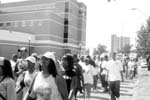Under the hottest sun of the week, hundreds of college students from all over the state united as one entity for the sake of principle, on Oct. 6, the first day of the Mississippi State Fair. Students from Jackson State University, Tougaloo College, Mississippi Valley State University and Alcorn State University marched from JSU's campus to the fairgrounds chanting, singing and waving signs in the air. The student march was initially planned in response to white supremacist Richard Barrett's announcement that Edger Ray Killen, suspected of helping plan the murders of civil rights workers James Chaney, Andrew Goodman and Michael Schwerner in Neshoba County in 1964, would be setting up an exhibit at the fair.
"Once we as individuals heard about the Klan coming to the fair, we all came together," said Jimmie Lee, 19, a JSU student advisory council member and march organizer. "As students we decided that if we don't do something, then this can happen again."
Lee said that JSU's administration was a great help in getting the students together. "They showed us what to do and told us who to contact, " he said.
A week before the fair started, though, Killen's wife announced that her husband would not be attending the fair, causing Barrett to cancel the booth. The march organizers said that despite the fact the Barrett would not be attending the fair, they still had to march.
Henry D. Fuller, 20, president of JSU's student political science board and an organizer, said, "Tougaloo and Jackson State are known in the past for marching and being involved in civil rights. It is history. We are making history."
African-American students also made history in the 1960s by protesting en masse against segregation and violence against Mississippi blacks. In fact, starting in 1963, the state fairgrounds became a makeshift jail where demonstrators, many young teens, were held in unsanitary and inhumane conditions. In 1965, the "Fairgrounds Hotel," as local newspapers called it, was used to imprison thousands of Mississippi Freedom Democratic Party marchers who were protesting that black candidates were left off the ballot. "Surrounded by barbed wire and monitored by searchlights at night, prisoners were kept in the livestock exhibition spaces and ate out of common food barrels," describes the Townsend Davis' book, "Weary Feet, Rested Souls" (W.W. Norton, 1998).
In addition to last week's march, students also planned a voter registration drive and circulated a petition for the murders of Chaney, Goodman and Schwerner to be prosecuted.
Marquita Miller, 19, a march organizer said, "It shows that we are not going to sit back and let this happen to us again. I think that our generation will see the spark of a revolution."
Also joining the march were 32 students traveling from the Valley campus in Itta Bena, Miss. MVSU Comprehensive Counselor Yolanda Jones said: "Our organization is bringing a voice from Valley considering that everyone there cannot come. Also in keeping with our heritage we feel that it is important to march today in memory of the three civil rights workers that were killed."
At around 1:30 p.m., students gathered in the middle of Lynch street to begin the march. There was a hub-bub of commotion, hats signs, t shirts, banners and bottles of water were handed out in the crowd.
JSU freshman Candance Frazier, 18 said: "This is my first year at Jackson State, and I am so excited to be able to unite with my classmates. By marching we are disproving the stereotypes about young people and showing that we will not stand by while things happen to us."
Students were not the only ones in line to march. Attorney and activist Chokwe Lumumba stood at the front of the line helping to direct the crowd.
"The Klan manifested its ugliest head in Barrett," Lumumba said. "Bush says that there are terrorists in other countries, but he has terrorists in is own country, even in his own party, like Haley Barbour. I am very happy to see the younger people get in the struggle. This shows that they understand that the struggle continues."
Also in line was Councilman Kenneth Stokes. "It is a new day and a new way. These are college-educated young people saying that something should be done," he said.
All the students did not share the same opinion about the Fair situation. JSU mass communications major Justin McCray, 21, said he feels that Barrett was just trying to get attention: "We should not be doing this. Just leave it alone and enjoy the Fair. Mississippi will never change until all of Mississippi changes it." McCray was filming the march for a class project.
Barrett, though, wasn't fazed. "The bulk of Mississippians, not just Richard Barrett, are not going to be bullied by the NAACP, ACLU, SNCC, etc. The march has shown their threats are hollow, their demands fall on deaf ears, and their agenda shall fail," he said Monday.



Comments
Use the comment form below to begin a discussion about this content.